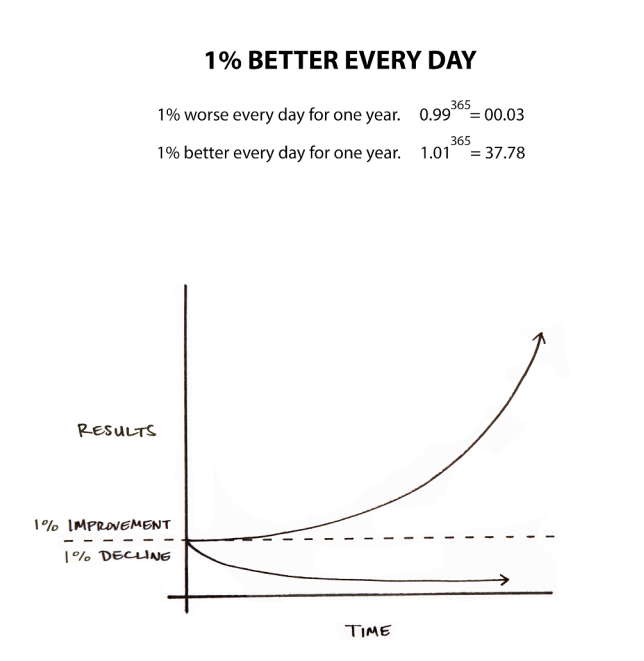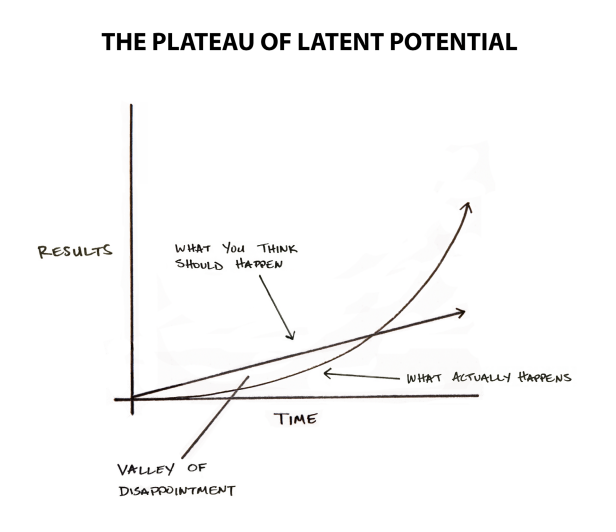Atomic Habits Notes
🌱 This post is in the growth phase. It may still be useful as it grows up.
1. The Surprising Power of Habits
Mantra
Consistency compounds.
Summary (AI generated)
Embrace the power of tiny changes. Seek 1% improvements everywhere. Small, consistent efforts compound exponentially over time. “You get what you repeat.” Focus on daily habits, not one-time transformations. Be patient; significant outcomes are often delayed. Shift from goals to systems. “Goals provide direction. Habits are the motor.” Avoid goal-oriented pitfalls. Winners and losers often share goals. Don’t let goals restrict happiness. Commit to the process. Build “atomic habits” as components of growth. Trust your systems. “You fall to the level of your systems, not rise to your goals.” Apply these principles consistently. Watch your atomic habits drive massive personal and professional growth.
“The aggregation of marginal gains” — Dave Brailsford’s philosophy of searching for tiny margins of improvement in everything you do. “Think about everything that goes into {a task}, and improve it by 1%. you will get a significant increase when you put them all together.”
How does a team of previously ordinary athletes transform into world champions with tiny changes that, at first glance, would seem to make a modest difference at best? Why do small improvements accumulate into such remarkable results, and how can you replicate that approach? (great question)
1% worse every day: .99365365 = 00.03 1% better every day: 1.01365 = 37.78

“Success is the product of daily habits, not once-in-a-lifetime transformations.”
“You get what you repeat.” “Your outcomes are a lagging measure of your habits.”
Follow the trend line of your choices to see where you’ll end up.
The Plateau of Latent Potential

The most powerful outcomes are delayed “The plateau of Latent Potential” — heating an ice cube from 25°C to 30°C will not make it melt. You have to break through the plateau to see the result. Most habits never take root long enough to see a meaningful difference.
“Change can take years before it happens all at once. For this reason, mastery requires patience.”
“When nothing seems to help, I go and look at a stonecutter hammering away at his rock, perhaps a hundred times without as much as a crack showing in it. Yet at the hundred and first blow, it will split in tow, and I know it was not that last blow that did it—but all that had gone before.” — Jacob Riis
“What determines whether we stick with a habit long enough to survive the Plateau of Latent Potential and break through to the other side? What is it that causes some people to slide into unwanted habits and enables others to enjoy the compounding effects of good ones?” (good question)
Forget about goals. Focus on systems instead.
Goals are about the results you want to achieve. Systems are about the processes that lead to those results. — Scott Adams, Dilbert cartoonist
“The only way to win is to get better each day.”
The score takes care of itself” — Bill Walsh, three-time Super Bowl, winner
Goals direction. Habits are the motor
This advice will change your life: pic.twitter.com/vjqkr0SN1X
— UpSkillYourLife (@UpSkillYourLife) June 29, 2024
Four problems with goals:
- Winners and losers have the same goals.
- Achieving a goal is only a momentary change.
- “Treating symptoms without addressing the cause”
- Bad results = bad systems
- Goals restrict happiness.
- Myth: “Once I reach my goal, then I’ll be happy.”
- Goals are at odds with long-term progress.
- “Your commitment to the process is what determines your progress.”
A System of Atomic Habits
“You do not rise to the level of your goals. You fall to the level of your systems.”
“Atomic habts are a component in the system of compound growth.”
Chapter Summary
- Habits are the compound interest of self-improvement. Getting 1% better every day counts for a lot in the long run.
- Habits are a double-edged sword. They can work for you or against you, which is why understanding the details is essential.
- Small changes often appear to make no difference until you cross a critical threshold. The most powerful outcomes of any compounding process are delayed. You need. You must be patient.
- An atomic habit is a little habit that is part of a larger system. Just as atoms are the building blocks of molecules, atomic habits are the building blocks of remarkable results.
- If you want better results, then forget about setting goals. Focus on your system instead.
- You do not rise to the level of your goals. You fall to the level of your systems.
Summary prompt
Please write me a summary of my notes on [specific chapter or topic] of [book or subject]. When you are ready, I will provide notes in markdown format. In creating this summary: 1. Prioritize items I have marked with the <mark> HTML tag. 2. Use actionable language. 3. Create a single paragraph summary. 4. Use short, 'punchy' sentences for impact. 5. Focus on key ideas and practical takeaways. 6. Aim for a concise yet comprehensive overview.